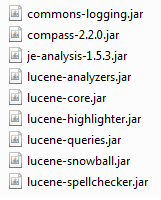全文检索 Compass 配置使用
我们在使用Lucene管理Document(对应数据库中表的行或记录)时,难免有些复杂,并且在做增量索引时会比较繁琐,因此需要用到Compass。 Compass对Lucene的使用就如同Hibernate和对Jdbc的使用,Compass的工作流程如下:
本文使用Compass2.2版本,所需jar如下:

使用compass的步骤和使用hibernate的步骤基本一致:
使用hibernate时步骤一般为:
1.建立实体类,也就是Entity,如Student,Teacher,这些实体类。
2.配置实体类到数据库的映射。配置方法一般有两种:
(1)使用xml。如(Student.hbm.xml)
(2)使用annotation 注解 @Entity ,@Id等
Hiberante中要求每个实体都要有个标识(Id),compass中也这么要求。
3.使用hibernate的API操作实体
Configuration cfg = new Configuration().configure(); //默认加载hibernate.cfg.xml
SessionFactory sessionFactory =cfg.buildSessionFactory(); //全局唯一
Session session = sessionFactory.openSession();
session.beginTransaction(); //开启事务
session.save(xxx);//保存
session.delete(xxx);//删除
session.get(xxx.class,id)//获得对象
........//其他操作
session.getTransaction().commit(); //提交事务
session.close(); //关闭session
而使用compass 和 hibernate的步骤几乎是一样的:
1.建立实体类,如Student,Teacher等实体类。
2.配置实体类到索引库的映射。
以Student类为例:
@Entity //在hibernate中,使用@Entity将Student类映射到数据库的student表
@Searchable(alias="product") //在compass中,使用@Searchable将Student映射到索引库中的 product 文档(Document),alias用来指定该实体类对应的document的名称,不设置alias则默认使用小写的类名。如果searchable的root属性设为false,则该类不会被创建为一个单独的document。一般该类作为另外一个类的组件时,才设置该属性为false。这事要想通过该类的属性搜索该类就会报错。
public class Student{
//hibernate 和 compass中都规定,实体必须有一个标识字段
private int id;
private String name;
private String fond;
private Teacher teacher;
@Id //hiberante中,使用@Id来将一个字段映射为实体的标识ID
@SearchableId //compass中,则使用@SearchableId将一个字段映射为实体的标识ID
public int getId(){
return id;
}
/*
* 在hibernate中,对应属性如果不设置的话,则默认的映射为对应名称的字段;
在compass中实体类的属性则需要使用@SearchableProperty来设置,设置用来检索的属性,以及属性值是否被索引、是否被存储,以及相关度boost
@SearchableProperty中的name属性用来指定filed的名称;
index指定是否建立索引,
Index.ANALYZE表示建立索引并进行分词(为默认值),即建立索引时会对该filed进行分词,并在检索的时候可以通过该filed进行搜索;
Index.NOT_ANALYZED 表示会对该字段建立索引,但不会进行分词;
Index.NO 表示不会对该字段建立索引,当然也不会进行分词了;
store表示该字段是否要被存储到索引库中,默认值为store=Store.YES;
指定Index.NOT_ANALYZED并且指定Store.YES,则是为了搜索到实体时,将该filed值加载出来;
boost表示相关度,相关度是一个float型的值,值越大,通过字段匹配的结果排序越靠前;
*/
@SearchableProperty(name="name",index=Index.ANALYZED,store=Store.YES,boost=3f)
public String getName(){
return name;
}
public String getFond(){
return fond;
}
/*
@SearchableComponent复合类型,该类型的对象Teacher被看做是当前类Student的一部分,一个组件,创建document时,复合类型的属性会和student的属性放在同一个document中。
当进行查询时,会先查询主类的数据元字段,也会查询组件类如Teacher类中的字段,因为在创建document时,teacher的数据元字段作为student的一部分放到了document中。
*/
@SearchableComponent
public Teacher getTeacher(){
return teacher;
}
public void setTeacher(Teacher teacher){
this.teacher = teacher;
}
}
//把root属性设为false,表示该类不是一个独立的实体,它只是其他类(Student)的一部分
@Searchable(root=false)
public class Teacher {
//此时该类的id就不能做为索引库中的标识了,因为该类被当做是Student的的一部分,而Student中已经有标识了。
@SearchableProperty(name="tid",index=Index.NO,store=Store.YES)
private int id;
/*应为在创建索引时,该name对应的索引字段为name,而在Student中name对应的索引字段也为name,会造成冲突,
* 所以需要将复合类型中与主类属性名字相同的该为其他的的名称,以免冲突。
*/
@SearchableProperty(name="tname",index=Index.ANALYZED,store=Store.YES)
private String name;
@SearchableProperty(name="tage",index=Index.NO,store=Store.YES)
private int age;
@SearchableProperty(name="tfond",index=Index.ANALYZED,store=Store.YES)
private String fond;
//也就是说,查询到Teacher类的某个实体时,可以根据该实体加载出来其对应的student对象。
@SearchableReference
private Student student;
//…………………………省略get/set方法
}
3.使用Compass中的API对实体进行操作:
Compasscompass = new CompassConfiguration().configure().bulidCompass();
/*compass 相当于 hibernate的sessionfactory
上面的configure()方法会自动去classpath找compass.cfg.xml配置文件,这个方法和hibernate中的configure()方法很相似,hibernate中的该方法用来加载hibernate.cfg.xml.
如果要制定其他名称的配置文件,可以使用configure(xxx).
CompassSession相当于hibernate中的Session
*/
CompassSession compassSession = compass.openSession();
compassSession.beginTransaction(); //CompassTransaction相当于 Hiberante中的Transaction,即compss中也是有事务支持的,和数据库很相似(也有事务回滚tx.rollback())
compassSession.create(entity)/.create(entity);//保存到索引文件
compassSession.delete(entity);//将实体从索引库中删除
compassSession.commit();
compassSession.close();
下面是测试时使用compass进行保存,查询等操作的关键代码:
@Searchable //告诉compass,将该类映射到Lucene的Document
public class Product {
private Integer id;
private String name;
private String content;
private Float price;
private String note;
private Integer position;
private Integer typeid;
public Product(){}
public Product(Integer id) {
this.id = id;
}
public Product(Integer id, String name, String content, Float price,String note,Integer typeid,Integer position) {
this.id = id;
this.name = name;
this.content = content;
this.price = price;
this.note = note;
this.typeid = typeid;
this.position = position;
}
@SearchableId //compass要求每个搜索实体类都要具有一个标识属性,这点和Hibernate相似
public Integer getId() {
return id;
}
public void setId(Integer id) {
this.id = id;
}
@SearchableProperty(index=Index.NOT_ANALYZED, store=Store.YES)//store的默认值为Store.YES
public Integer getTypeid() {
return typeid;
}
public void setTypeid(Integer typeid) {
this.typeid = typeid;
}
@SearchableProperty(boost=2)//boost的默认值为1,用于设置属性在索引中的重要性
public String getName() {
return name;
}
public void setName(String name) {
this.name = name;
}
@SearchableProperty
public String getContent() {
return content;
}
public void setContent(String content) {
this.content = content;
}
//价格不需要进行搜索,但需要存储,如果没有存储,就需要从数据库中获取价格了
@SearchableProperty(index=Index.NO)//store的默认值为Store.YES
public Float getPrice() {
return price;
}
public void setPrice(Float price) {
this.price = price;
}
@SearchableProperty(store=Store.YES)
public String getNote() {
return note;
}
public void setNote(String note) {
this.note = note;
}
@SearchableProperty(index=Index.NOT_ANALYZED, store=Store.YES)//store的默认值为Store.YES
public Integer getPosition() {
return position;
}
public void setPosition(Integer position) {
this.position = position;
}
}
public class ProductSearchBean {
private Compass compass = null;//-->SessionFactory
public ProductSearchBean(){
try {
//编程式配置
compass = new CompassAnnotationsConfiguration()
.setSetting(CompassEnvironment.CONNECTION, "file://indexfile")
//.setSetting(CompassEnvironment.CONNECTION, "ram://index")//在内存中建立索引
.setSetting("compass.engine.analyzer.default.type", "net.paoding.analysis.analyzer.PaodingAnalyzer")
.setSetting("compass.engine.highlighter.default.formatter.simple.pre","")
.setSetting("compass.engine.highlighter.default.formatter.simple.post","")
.addScan("lxq.compass").buildCompass();
} catch (Exception e) {
e.printStackTrace();
}
}
public void buildIndex(){
CompassSession session = null;
CompassTransaction tx = null;
try {
session = compass.openSession();
tx = session.beginTransaction();
Product p1 = new Product(12,"c瑜珈球","非常好的瑜珈球",12f, "www", 2, 12);
session.create(p1);
Product p2 = new Product(35,"b瑜珈球","天花板瑜珈球,good",42f, "mmm",2,9);
session.create(p2);
Product p3 = new Product(8,"a蓝球瑜珈球","蓝球小子",125f, "ppp",5,8);
session.create(p3);
tx.commit();
} catch (CompassException e) {
e.printStackTrace();
tx.rollback();
}finally{
if(session!=null && !session.isClosed()) session.close();
}
}
public void deleteIndex(Product product) {
CompassSession session = null;
CompassTransaction tx = null;
try {
session = compass.openSession();
tx = session.beginTransaction();
session.delete(product);
tx.commit();
} catch (CompassException e) {
e.printStackTrace();
tx.rollback();
}finally{
if(session!=null && !session.isClosed()) session.close();
}
}
public void updateIndex(Product product) {
CompassSession session = null;
CompassTransaction tx = null;
try {
session = compass.openSession();
tx = session.beginTransaction();
session.delete(product);
session.save(product);
tx.commit();
} catch (CompassException e) {
e.printStackTrace();
tx.rollback();
}finally{
if(session!=null && !session.isClosed()) session.close();
}
}
public void destroy(){
compass.close();
}
public QueryResult search(String keyword, int firstIndex, int maxResult) {
QueryResult qr = new QueryResult();
CompassSession session = null;
CompassTransaction tx = null;
try {
session = compass.openSession();
tx = session.beginTransaction();
//对所有索引Field进行搜索,你也可以指定对某个Field搜索,如:"name:jack",如果想指定多个字段可以用空格和"+"隔开如"name:jack +content:xxx"
CompassHits hits = session.find(keyword);
List products = new ArrayList();
int length = firstIndex+ maxResult;
if(length>hits.length()) length = hits.length();
for(int i=firstIndex; i search(String keyword, Integer typeid, int firstIndex, int maxResult) {
QueryResult qr = new QueryResult();
CompassSession session = null;
CompassTransaction tx = null;
try {
session = compass.openSession();
tx = session.beginTransaction();
//查询指定类别的匹配记录,并按position降序排序
CompassQueryBuilder queryBuilder = session.queryBuilder();
CompassHits hits = queryBuilder.bool()
.addMust(queryBuilder.spanEq("typeid", typeid))
.addMust(queryBuilder.queryString(keyword).toQuery())
.toQuery().addSort("position", SortPropertyType.FLOAT, SortDirection.REVERSE)
.hits();//sql: typeid=1 and (xxxx like ?) order by positoin desc
List products = new ArrayList();
int length = firstIndex+ maxResult;
if(length>hits.length()) length = hits.length();
for(int i=firstIndex; i
补充说明:
一、 这两段代码具有一样的功能,下面的代码另外还多了个很重要的功能,自动选择正文中最匹配关键字的内容中的一部分输出。因为很多时候一篇文章几千字,我们只想显示有关键字的那部分的摘要,这时候这个功能就很方便。
Stringcontent = hits.highlighter(i) .fragment("content");
String content =hits.highlighter(i).setTextTokenizer(CompassHighlighter.TextTokenizer.AUTO).fragment("content");
二、另外在getContent()方法上的@SearchableProperty中还可以加入例如converter ="htmlPropertyConverter",主要是用来将文章中的HTML标签进行过滤获取纯文本,在建立到索引中。在配置文件中添加
然后就可以自己写实现类了,我也是网上看到的,给个链接http://blog.csdn.net/u010469430/article/details/12384347。
三、多种查询方式
// 查询方式一:使用查询字符串(可以有查询语法)
// CompassHits hits = session.find(queryString);
// -----------------------------------------------------------------
// 查询方式二:构建CompassQuery对象
// 1,查询所有
CompassQuery query1 = session.queryBuilder().matchAll();
// 2,关键词查询
CompassQuery query2 = session.queryBuilder().term("title", "lucene");
// 3,范围查询
CompassQuery query3 = session.queryBuilder().between("id", 5, 15, true);
// 4,通配符查询
CompassQuery query4 = session.queryBuilder().wildcard("title", "lu*n?");
// 5,短语查询
// 设定精确间隔的匹配方式,写法1
CompassMultiPhraseQueryBuilder qb = session.queryBuilder().multiPhrase("title");
qb.add("lucene", 0); // 第一个词位置从0开始
qb.add("工作", 2); // 第二个词位置从2开始
CompassQuery query5 = qb.toQuery();
// 设定精确间隔的匹配方式,写法2
CompassQuery query6 = session.queryBuilder().multiPhrase("title")//
.add("lucene", 0) // 第一个词位置从0开始
.add("工作", 2) // 第二个词位置从2开始
.toQuery();
// 设定最多间隔的匹配方式
CompassQuery query7 = session.queryBuilder().multiPhrase("title")//
.add("lucene") //
.add("工作") //
.setSlop(5) // 指定的词之间的最长间隔不超过5个词
.toQuery();
// 6,布尔查询
CompassQuery query = session.queryBuilder().bool()//
// .addMust(query)
// .addMustNot(query)
// .addShould(query)
.addMust(query1)//
.addMustNot(query3)//
.toQuery();
CompassHits hits = query.hits();
四、当然上面可以不用编程式配置,而通过Compass compass= new CompassConfiguration().configure().bulidCompass();使用类似如下的配置文件。
Compass与Spring的集成
先思考一下compass不与spring集成时的情况。
我们将一个entity保存到数据库的同时,也要将该实体相关的数据信息保存到索引库中。所以代码常为一下情况:
Public void saveStudent(Student stu){
hibernateTeplate.save(stu);//保存到数据库中
compassSession.save(stu);//保存到索引库中
}
我们有一点需要保证的是,必须在数据库保存成功后才能将实体对象保存到索引库中,然而在没有任何外界条件限制的情况先,数据库的事务和compass的事务是两个不同体系的事务,他们不可能自动的将事务并为一起。这样就无法保证整个操作的流程控制在同一个事务中,所以我们就要想办法来解决这个问题。
使用compass与spring集成,能很好的解决这个问题,spring会为hibernate与compass提供同一个事务管理,将整个操作流程(如上的saveStudent()方法)纳入同一个事务支持当中。
下面看一下配置中JPA(hibernate)、compass、spring的集成:
其中JPA(hibernate)与spring集成与前面完全一致,就是在后面加了一个compass的配置:
cn.itcast.bean.product.ProductInfo
cn.itcast.bean.product.Brand
cn.itcast.bean.product.ProductStyle
cn.itcast.bean.product.ProductType
net.paoding.analysis.analyzer.PaodingAnalyzer
file://e:/index
200
]]>
]]>
org.compass.spring.transaction.SpringSyncTransactionFactory
按照上面的配置你仍然需要在代码中写相应的创建、删除索引的语句,在配置文件中添加下面的代码就可以一切都自动化了。
CompassGps - Gps的核心模块,管理GpsDevice,有两种实现:SingleCompassGps和DualCompassGps。
CompassGpsDevice - 处理各种数据源到索引的操作:JDBC, Hibernate,iBatis等。不能独立使用而必须融合到CompassGps中。
本文参考文章如下:
http://blog.csdn.net/u010469430/article/details/12384139
http://blog.csdn.net/u010469430/article/details/12384347
http://blog.csdn.net/xpsharp/article/details/8362398
